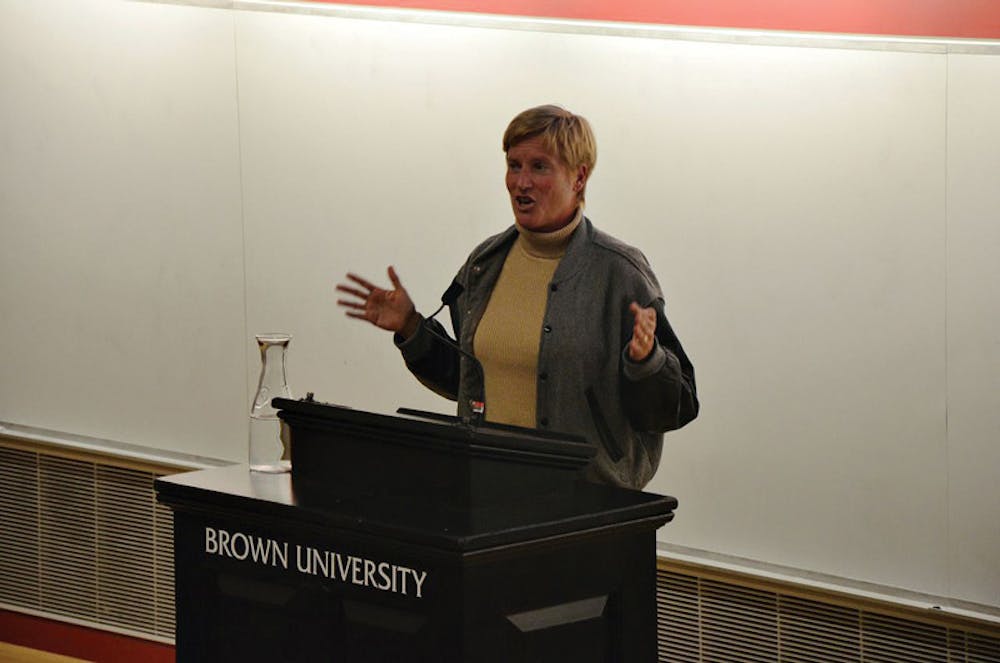Trailblazing sports writer Karen Crouse said she is often called a “psychologist to the athletes,” as though she possessed a special ability to get athletes to open up. But she said her approach is simple.
“I empathize with (athletes) and treat them as human beings,” she said. “They’re not just what they achieved on the field. They’re people.”
Crouse, who has been a sports columnist at the New York Times since 2005, delivered the Casey Shearer Memorial Lecture Tuesday night in Metcalf Auditorium. The lecture is held annually in honor of Casey Shearer ’00, a top student passionate about sports writing and broadcasting who died of an undetected heart virus just days before his graduation.
His father, Derek Shearer, introduced Crouse as “exactly the kind of sports writer that Casey aspired to be and was becoming.”
“Above all, what is special about her reporting is that it is about human beings,” he added.
In covering sporting events, Crouse tries to tell a story, not just present statistics. It is often not the star athletes who give the best stories, she said.
Crouse aims to recount of the game through “a different set of eyes” in a way that will make her stories appeal to people who do not consider themselves interested in sports, she said.
Crouse shared her long and impactful path to becoming a sports columnist at the Times. She “didn’t get into the business to be a rabble-rouser,” but rather “to have a positive impact on people’s lives,” she said. Highlights from her career include motivating Olympic gold medalists and encouraging golf clubs to accept female members, she said.
Her sports writing career was indirectly launched by an assignment involving creating a magazine for one of her eighth-grade classes while she was growing up in Santa Clara, California.
Crouse, a swimmer, decided to create a magazine on the sport, entitled “Splash.” Mike Bruner, who at the time was one of the best swimmers in the world, trained at the same swimming club as Crouse did, she said. Bruner was taking a year off from his studies at Stanford to train for the Olympics when she reached out to him for an interview.
When Bruner was struggling at the Olympic trials that year, his coach approached him with the interview he had done with Crouse, in which Bruner explained how he bounces back from a bad day in the water. His coach made him read his quotes aloud three times. Bruner went on not only to qualify for the 200-meter butterfly but also to win the Olympic gold medal in the event at the 1976 Olympic Games.
After the Olympic trials, Bruner told a local newspaper in Santa Clara that he owed his victory to Crouse, since reading her interview put him in the right state of mind to qualify for the event.
Crouse said she told her father what she wanted to do when she grew up after learning of Bruner’s comments: “I want to write stories that positively impact people’s lives.”
Over 30 years later, Bruner emailed Course and told her he would not have made it to the Olympics without her. Crouse emailed him back, “You’re why I’m in this profession.”
Since then, Crouse, who was a collegiate swimmer at the University of Southern California, has gone on to cover numerous international sporting events, including the NFL, the Winter and Summer Olympics and the World Cup. In 2005, Crouse joined the New York Times as a sports columnist, taking what she described as a “circuitous route” through nine different publications.
She began as a beat reporter covering the New York Jets before recently taking over the Times’ golf beat. Most recently, she covered this year’s Masters Golf Tournament at the Augusta National Golf Club.
When Crouse first reported on the Masters Tournament in 2012, Augusta did not accept female members, which was a topic of debate at the time. Her reporting there and at the Royal and Ancient Golf Club of St. Andrews helped put pressure on the clubs to change their policies — something both have done since, Crouse noted.
Blake Piel ’18 said he found the lecture “very useful and inspiring, being a student thinking about journalism as career.”
Sophia Reichert ’18 said the lecture was especially intriguing because it featured a “woman talking about a field that is dominated by men.”





